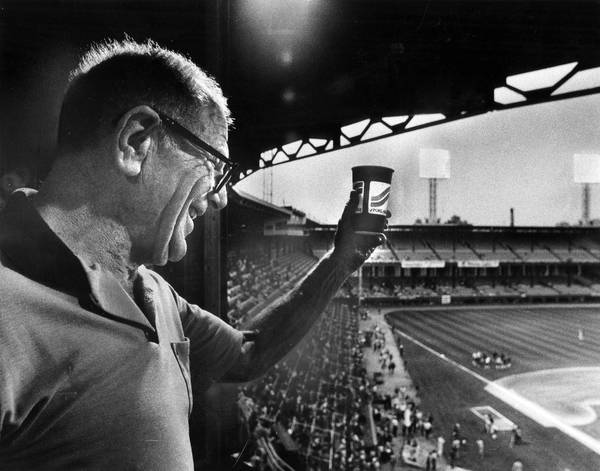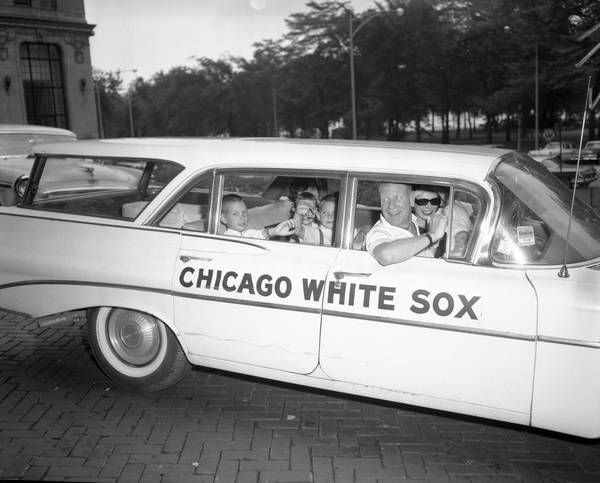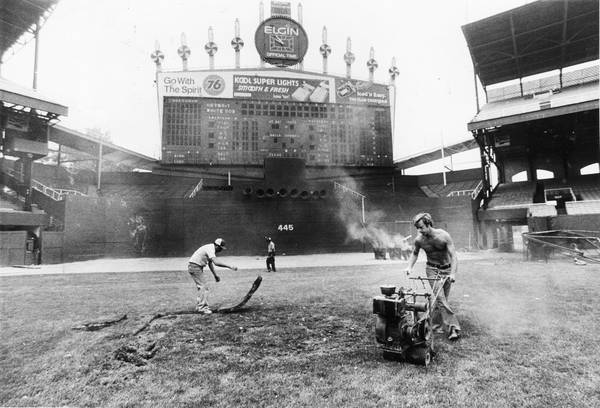[ad_1]
Mike Veeck had a documentary to promote, but he couldn’t start without thinking about something.
“What’s going on with my White Sox?” He asked. “Dude, they’re killing me.”
I told Veeck that the situation was worse than he could have imagined. The man who gave us the Disco Destruction riot He disagreed.
“No,” he replied, laughing. “I can imagine.”
Veeck, whose father, former Sox owner Bill Veeck, once served as a White Sox marketing executive, is the subject of “Saint of Second Chances,” a Netflix documentary by Jeff Malmberg and Morgan Neville that will be released Tuesday.
The title references both the 72-year-old Veeck’s passion for giving chances to people no one else can touch and his zig-zagging career path, from his ill-fated Disco Demolition Night promotion at Comiskey Park in 1979 to unemployment and owning several small businesses. major league teams return to the major leagues for one last shot at marketing what were then called the Tampa Bay Devil Rays.
There is also a reference to Veeck giving drug-addicted superstar Darryl Strawberry one last chance with an independent league team. Saint Paul Saints, and other characters for whom he provided opportunities, including Ina Borders, the first female professional player, and “Super Dave” Stevens, a legless man for whom the Saints hit.
Veeck’s story probably sounds vaguely familiar to longtime baseball fans, especially those who remember him in Chicago team building with radio personality Steve Dahl about the anti-disco promotion that famously got out of hand. Veeck has finally solved the problem of being forever associated with this infamous night.
“I felt guilty for long enough,” he said. “I stopped feeling guilty about it.”
But what happens after Veeck’s brief return to the majors is what separates “Second Chances” from typical baseball documentaries.
No spoilers here, but it’s worth watching even if you’re not much into baseball. And if you’re a Sox fan, it’s a much-needed salve after a season like this.
Veeck’s son, Night Train, a former Sox employee, convinced him Doing the project about the Veeck family — including Mike’s wife Libby and daughter Rebecca — and their involvement with baseball. Mike’s grandfather, William Veeck, was president of the Chicago Cubs. Bill Veeck helped plant ivy at Wrigley Field Near the beginning of his Hall of Fame career.
It is a mix of interviews with Bill Veeck and vintage video clips featuring highlights from the late 1970s Sox, as well as dramatic scenes recreated by the directors, featuring Mike Veeck as Bill and actor Charlie Day as Mike.
Andy the Clown, Tony La Russa, Jimmy Piersall, Dave Dombrowski, Nancy Faust and other memorable characters from the ’70s era make cameo appearances, and actor Jeff Daniels narrates Veeck’s story. Following the negative reaction to Disco Demolition Night, Day turned out to be the perfect choice to portray a flawed person with alcohol addiction and self-esteem issues that ends his dreams of a major league career in marketing.
“That flaw in his shoulder, his attitude, he really got it,” Veeck said of Day. “He did a great job, other than being too handsome.”
Veeck originally wanted to work with Neville on an aborted project where they would make someone the Saints’ manager for a week and film what happened. Several decades passed before he turned to the project “Second Chances,” which became a more personal film. Mike’s story intro and outro of baseball boundaries.
Veeck didn’t know that Neville and Malmberg wanted him to play his father until he traveled to Los Angeles for filming. In the movie, he jokes that he wouldn’t let them cut off his legs to look like his father, who had a nail leg with an ashtray inserted into it.


When the film begins, we find Day trying to escape the massive shadow of Mike Veeck’s father, only to be offered the chance to market a team after Bill purchases the Sox for the second time in 1975.
In our interview, Mike said that if he had played his father 30 years ago, he could have saved a ton of money on therapy sessions.
“When my father died, I said you had nothing left to say; “We told each other everything,” he said. “That was stupid. This was not true. … I would love to tell him what a great father he is. Look him in the eye, hug him, and say, “I really appreciate everything you’ve taught me as a father.”
“Thank God I didn’t have to take advantage of them until I needed them, like coming out in the bottom of the ninth. There was something about the tank he provided.
Disco Demolition Night, which I attended as one of the hooligans trespassing on the field and the dugout at Old Comiskey. is discovered early very detailed. Veeck admits in the film that he would not have made the promotion if he thought that decades later anti-disco sentiment would be seen by some 21st-century observers as an indication of homophobia among a group of mostly drunken men in their teens or pre-teens. 20s.
Although the vast majority of those celebrating that night were kids who wanted to party while supporting rock ‘n’ roll over disco, Night Train eventually convinced his father that some people were hurt by the promotion.
“People like you or me who don’t know how the business really works can look at this and say that,” Mike told me. “Some say it more harshly, and I respond a little harsher. But that seems to be the case for people of the current generation, and it pains me.”

I knew Bill Veeck a little from the stands at Wrigley. He sat out his final years in center field with his friends in the early 1980s after selling the Sox following perceived disdain from manager Eddie Einhorn and refusing to return to Comiskey. What always amazed me was how much beer Bill could drink without going to the downstairs bathroom.
“And the fans were always willing to let him line up, but he never accepted (cuts),” Mike said. “That’s what made him the man he is.”
I told Mike it was crazy that his father’s storied life had never been made into a film. Bill Murray was rumored to play Bill in the “Veeck as in Wreck” biopic, which never came to fruition. Mike said baseball movies don’t usually get made because most of the financing depends on international sales, but noted that Murray “would make a great Bill Veeck.”
“They have more similarities than people think – quirky approaches, curiosities,” he said. “It would be a lot of fun.”
Charleston, SC and St. Veeck, who lives in St. Augustine, Fla., sold the Saints this year and is looking for a chance to manage a team with Night Train, the fourth-generation Veeck in the baseball business. He playfully said he would be willing to return to the majors if someone called me and said, ‘Let’s go after those White Sox.’ ”
While this would be highly improbable even for Veeck, it would be the perfect ending. But if that happens, Veeck has promised not to move the Sox to any of the gossip sites.
“The ballpark belongs on the South Side,” he said. “It’s almost the heart and soul of it. I think it has to be a communal effort to stand up, whether it’s Barack Obama or (Michael) Jordan and those guys. “The South will rise again and all hands must be mobilized.”
 Best American Comics News bestamericancomics.com started its broadcasting life on December 21, 2022 and aims to offer original content to users. Aiming to share information in technology, science, education and other fields, bestamericancomics.com aims to provide its readers with the most up-to-date and comprehensive. Since the content of the site is created by expert writers, readers are reliable and accurate referrers.
Best American Comics News bestamericancomics.com started its broadcasting life on December 21, 2022 and aims to offer original content to users. Aiming to share information in technology, science, education and other fields, bestamericancomics.com aims to provide its readers with the most up-to-date and comprehensive. Since the content of the site is created by expert writers, readers are reliable and accurate referrers.


